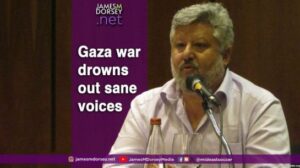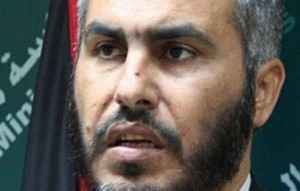click here to listen on SoundCloud
Gershon Baskin may be one of the few sane voices left on both sides of the Israeli-Palestinian divide. Baskin speaks with authority when he denounces the Israeli assault on Gaza as a war crime and Hamas for its brutal October 7 attack on Israel that killed 1,400, primarily civilian, Israelis.A hostage negotiator, former advisor to Israeli prime ministers, critic of the Israeli occupation of Palestinian lands, and an investor in East Jerusalem housing for Palestinians, Mr. Baskin negotiated Hamas’ 2011 release of Israeli soldier Gilad Shalit in exchange for 1,027 Palestinians, including the group’s Gaza leader, Yahya Sinwar, from Israeli prisons.
Mr. Baskin recalls his Hamas counterpart Ghazi Hamad, a member of the group’s political bureau and erstwhile proponent of a two-state resolution of the Israeli-Palestinian conflict, involving the creation of an independent Palestinian state alongside Israel, as saying on the day of Mr. Shalit’s release: “Next time we will negotiate peace!”
Those were the days. In hindsight, they are days of missed opportunities wasted by leaders on both sides of the Israeli-Palestinian divide that either wanted to thwart any chance of an equitable solution of the conflict and/or cared more about their personal interests than the fate of their people.
Last month, the man who asserted he wanted to negotiate peace celebrated Hamas’ October 7 wanton slaughter of innocent civilians and called for more.
“We must teach Israel a lesson. We will do this again and again. The Al Aqsa Flood was just the first time and there will be a second, a third, a fourth… Will we have to pay the price? Yes, and we are ready to pay it… We are the victims of the occupation. Period. Therefore, nobody should blame us for the things we do. On October 7, October 10, October one-millionth, everything we do is justified,” Mr. Hamad told the Lebanese Broadcasting Corporation.
Calling for the “annihilation of Israel,” Mr. Hamad was referring to the October 7 attack by Hamas’ codename for the assault.
Mr. Baskin should not have been surprised by Mr. Hamad’s turn around.
“Whenever in the past I talked with Baskin, I always came away both frustrated and impressed. Frustrated that he always accepted his private face-to face discussions of Palestinian leaders, while they would right afterwards turn around and incite publicly for violence. Impressed at his commitment to work for peace, no matter how frustrating his Palestinian interlocutors were.,” said Paul Shindman, a former journalist and friend of Mr. Baskin in an email to the author.
Moreover, Mr. Hamad and other Hamas leaders seem locked into a competition with Israeli leaders on who can make the most blood-curdling statements.
Israeli leaders have echoed Hamas’ justifications for the October 7 slaughter, justifying Israel’s indiscriminate bombings by asserting there are no innocent civilians in Gaza and that Israel is fighting “human animals.”
The competition suggests that raw emotions, deep-seated mutual resentment, and the desire for vengeance on both sides of the Israeli-Palestinian divide will take years to overcome.
Some hope, in the belief that Prime Minister Binyamin Netanyahu’s political days are numbered because he will have to take the blame for Israel’s October 7 intelligence and military failure, that a Hamas defeat and change in Israel will open the door to talks to definitively resolve the conflict.
Ram Ben Barak, a former senior intelligence official and contender for leadership of Yesh Atid, Israel’s main opposition party, this week illustrated just how deep and widespread Israeli anti-Palestinian sentiment is.
In an interview with Israel’s Channel 12, Mr. Ben Barak called for the expulsion of Palestinians from Gaza.
“If they are refugees, it’s better to be a refugee in Canada than in Gaza. So, let us distribute Gazans all over the world. They are 2.5 million people. Each country takes 25,000. 100 countries. That’s humane and needs to be done. If the world wants to solve the Palestinian problem, it has the ability to do so.”
To be fair, Mr. Ben Barak has also called for an end to settler violence against Palestinians in the West Bank.
Even so, Mr. Baskin, the hostage negotiator, tore this week into Mr. Hamad in an open letter to the Hamas official whom he has known for 18 years, spoken to more than 1,000 times, met four times, and unsuccessfully tried to meet again in 2021.Click here to read the Open letter to Ghazi Hamad
“I think you have lost your mind and you have lost your moral code. You have crossed the line between humanity and inhumanity. I have never justified the killing of innocent people. I never imagined that you would justify the killing of innocent civilians… These are not the actions of human beings,” Mr. Baskin wrote.
“I always thought you were a man with principle of humanity. How can you justify the things that your people did? How can you call for 1 million October 7? I have called Israel’s bombing of innocent civilians in Gaza a war crime,” Mr. Baskin added.
Mr. Hamad’s Israeli interlocutor described how he shrugged off Gazan assertions that Hamas only cared about itself and not about Palestinians. He advised Gazans to talk to the Hamas official.
“You built tunnels and bunkers for your own people — not 1 single shelter for the people of Gaza. You ran away from Gaza and deserted your people. I am sure you took your privileged family with you when you ran away,” Mr. Baskin thundered.
Hamas political bureau member Moussa Abu Marzouk confirmed Hamas’ attitude in an October 30 interview with Russia Today’s Arabic channel.
“We have built the tunnels because we have no other way of protecting ourselves from being targeted and killed. These tunnels are meant to protect us from the airplanes. We are fighting from inside the tunnels. Seventy-five percent of the population of Gaza are refugees, and it is the UN’s responsibility to protect them,” Mr. Abu Marzouk said.
Mr. Baskin’s letter is more than an expression of anger, revulsion, and disappointment in a man he had come to trust and with whom he believed Israel could do business.
It testifies to the deep, difficult to bridge rift, which will be a destructive legacy of a war that has shattered the lives of a majority of Gazans and the lives of Israeli victims of the Hamas attack and their families as well as Israel’s confidence and own proclaimed moral code.
Originally Published by James Dorsey at https://www.jamesmdorsey.net/




